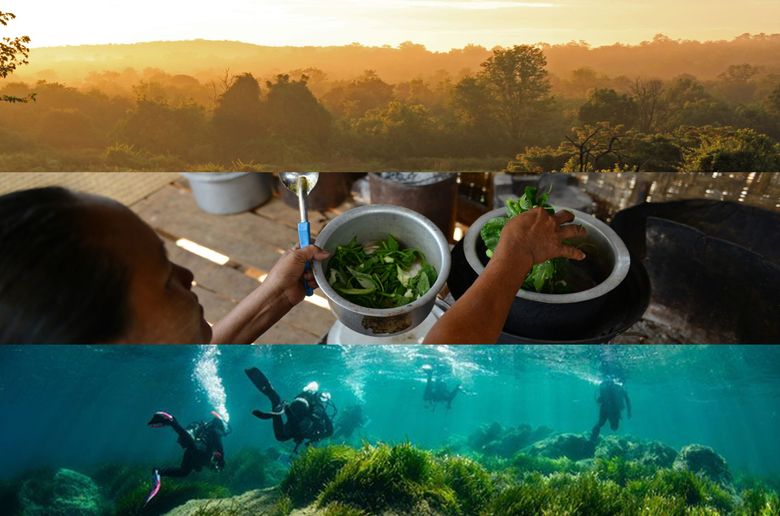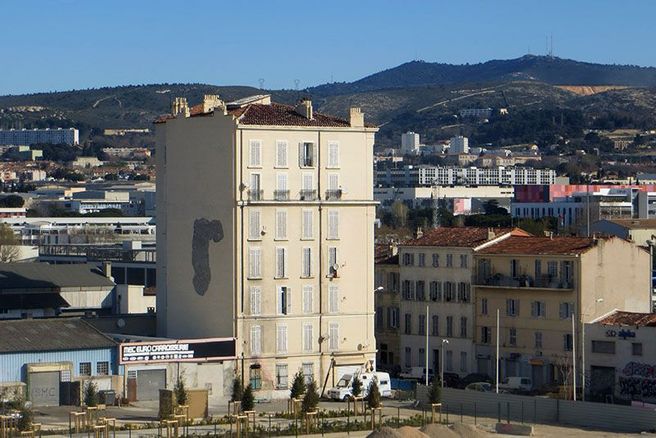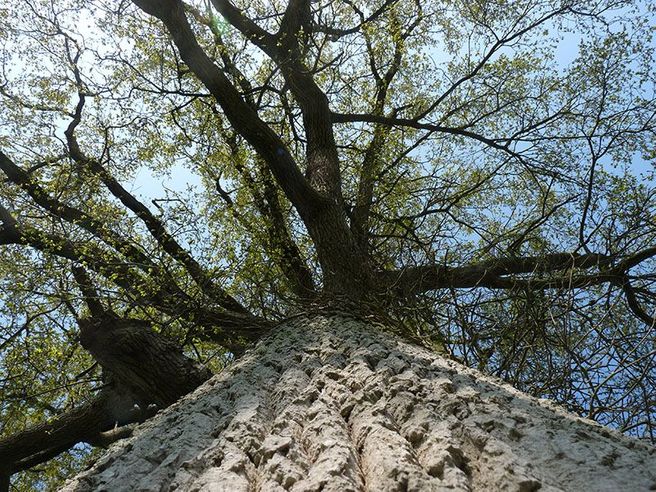► Over €2,200,000 raised to help save the planet
ENVIRONMENTAL PROJECTS


Noah’s Ark of the Ocean Twilight Zone
Location: Mediterranean area
By: 1 OCEAN Fondation
Year: Festival 2023
The Festival is funding this project up to €50,000 excl. tax.
The aim of the 1 OCEAN Foundation under the aegis of the CNRS Foundation is to explore and document the seabed, by supporting scientific research missions, in order to better understand and protect the Ocean, an exceptional common good.
The project is led by the photographer and explorer Alexis Rosenfeld. Making the underwater world his universe he spent 10 000 hours below the surface in search of new stories to tell.
Exploration is at the heart of all scientific discovery, allowing access to knowledge. The scientific explorations are showcased in photographic productions, documentary films, interviews, exhibitions, as well as a detailed communication programmes.
On the eve of UN Biodiversity Conference COP 15, UNESCO and the 1 OCEAN Foundation are launching a scientific exploration programme on Mediterranean red gorgonians. In response to last summer’s unprecedented mass mortality episode, scientists are seeking to understand how gorgonians and their ecosystems can survive in the ocean twilight zone.
For these species, the ocean could act as a thermal shield and its depths could constitute a salutary refuge.
Let’s rewild the Vercors
Location: Vercors
By: ASPAS
Year: Festival 2023
The Festival is funding this project up to €50,000 excl. tax.
While biodiversity is facing an unprecedented crisis and the sixth mass extinction is underway, it has become urgent to preserve areas where nature can freely evolve and where flora and fauna find shelter from human destruction and exploitation.
In response to this challenge, ASPAS works to improve the protection of certain areas in France, and thus increase the number of sites in free evolution through the creation of Réserves de Vie Sauvage® and Havres de Vie Sauvage®.
This is to form a network of habitats for the regeneration of living beings, while benefiting their surrounding environment. Most scientists have hailed this approach as a genuine long-term response to the current planetary crises.
The overall objective of this project is to create a vast, freely evolving area in the Vercors Massif by using innovative methods and mechanisms. It will serve as a gateway to the Southern Alps, relying on the existing Wildlife Reserves® (Grand Barry® and Vercors Vie Sauvage).
PRIME: RESTORING THE MEDITERRANEAN COASTLINE
Location: Cannes
By: Cannes Endowment Fund (in partnership with NaturDive and BlueaLeaf Conservation)
Year: Festival 2022
The Festival is funding this project up to €50,000 excl. tax.
As the climate emergency and successive crises rumble on, the Mediterranean coastline and Cannes’ surrounding countryside are under threat. The PRIME project is tackling these issues by raising public awareness of the situation while protecting and restoring the Mediterranean’s Posidonia oceanica meadows. Native to the Mediterranean, Posidonia oceanica has a great many benefits and stores much more carbon than even the Amazon rainforest. The Festival will be supporting PRIME specifically in restoring depleted Posidonia oceanica in the Bay of Cannes.
The project ultimately aims to achieve low-carbon label status, allowing it to offer all interested parties the opportunity to offset unavoidable greenhouse gas emissions. This would make it one of the Mediterranean’s very first “blue carbon” projects, a scheme that runs alongside the forest-focussed “green carbon” projects.
The Festival’s donation will be exclusively channelled into the team’s seagrass restoration efforts.
Restoring seagrass meadows in specific areas goes some way to mitigating their decline and is an effective solution that could lead to reviving lost carbon stores and sinks and re-establishing other vital benefits that these seagrasses bring to the ecosystem. Each Posidonia oceanica restoration campaign requires a site-specific experimental study. As well as returning the ecosystem to its original state, restoration also strengthens the seagrasses and slows down their erosion.
COMBATTING ENERGY POVERTY IN NEIGHBOURHOODS IN MARSEILLE
Location: Marseille
By: GERES
Year: Festival 2022
The Festival is funding this project up to €50,000 excl. tax.
In France, 3.5 million households live in energy poverty, suffering from high energy bills combined with low incomes. This initiative runs in Marseille’s La Cabucelle – Saint Louis district, an area characterised by subpar housing and a high percentage of low-income households.
The scheme aims to empower isolated families and individuals living in energy poverty by helping them to improve living conditions in their homes. Home visits are scheduled with a view to providing personalised support, in some cases leading on to emergency works (such as double-glazing and sealing cracks and gaps) conducted by Impulse Toit, a local back-to-work charity. Group workshops are in place to make households aware of their rights and existing funding, and teach them to better understand energy consumption and prevent health and safety risks.
The Festival’s donation will be used to bolster the anti-energy poverty scheme and increase the total number of beneficiaries targeted for 2022/2023.
According to a GERES estimate, it costs €1,000 to €1,500 to raise a household out of energy poverty. The association’s support ranges from providing energy advice visits to conducting emergency works and fitting equipment. These works and the materials used cost around €800. Past experiences have shown that around 10 to 20% of targeted households require this type of work.
GERES provides support for around 35 to 50 households, depending on the identified needs.

Orchard plantation project
Location: South of France
By: Carbon&Co
Year: Festival 2023
The Festival is funding this project up to €231 770 excl. tax.
5 farmers from the South of France are planting Low Carbon Label* orchards helping to relocate the apple, pear and almond French branches and storing 3 311 tons of carbon with positive impacts on biodiversity, soil health and water and air quality.
SUSTAINABLE FOREST MANAGEMENT PROJECT
Location: Grasse (France)
By: Ma Forêt
Year: Festival 2021
The Festival is providing full funding for this project up to €149,586.58 excl. tax.
This native Mediterranean forest in the heights of Grasse is currently seeing dieback among its Scots pine trees – some of which are over a century old – while its downy oak trees are drying out, all across a 75-hectare area. The project’s aim is three-fold: helping the forest to regenerate, preparing it for climate change, and protecting ancient trees teeming with life.
POST-FOREST FIRE REFORESTING PROJECT, CENTRE NATIONAL DE LA PROPRIÉTÉ FORESTIÈRE
Location: Grasse (France)
By: Centre National de la Protection Forestière
Year: Festival 2021
The Festival is providing full funding for this project up to €32,250.00 excl. tax.
This project was launched following the 2017 forest fire that swept through Saint-Cézaire sur-Siagne in Grasse’s back country, ravaging 53 hectares of forestland in the process. The reforestation plans involve a mix of different species and aim to rebuild the landscape at a popular sight-seeing spot.
SUPPORTING AGRO-ECOLOGICAL TRANSITION IN LIVESTOCK FARMING AND REPLENISHING THE LOIRE AREA’S BOCAGE
Location: France
By: Solenat
Year: Festival 2022
The Festival is funding this project up to €90,000 excl. tax.
Deep in the heart of the Loire region, the Carbocage and livestock farming project helps protect the wooded countryside and support livestock farms in shifting towards a low-carbon approach. Participating farmers in the Loire region will be rolling out hedgerow-boosting plans: planting and improving management to capture and store carbon and foster biodiversity. The farmers will be embarking on an ecological transition to improve their carbon footprint by making changes to their livestock and growing. As an example, they will be reducing their reliance on imports by growing protein-rich feed.
This project tackles carbon and biodiversity and enjoys ‘French Low-Carbon Label’ certification.

GROWING FORESTLAND ON BROWNFIELD SITES AND ABANDONED FARMLAND IN THE NIEVRE REGION
Location: France
By: Centre National de la Protection Forestière
Year: Festival 2022
The Festival is providing full funding for this project up to €62,500 excl. tax.
This project in Sauvigny-les-Bois (Nièvre) involves afforestation on former farmland spaces that are currently brownfield sites. The afforestation plans involve a diverse mix of tree species. The project will have positive knock-on effects on protecting the water here (the site is on the banks of a stream) and welcoming in members of the public. This initiative will help capture several thousands of tCO2, and is a carbon-offsetting scheme that will be granted the French Ministry for Ecological Transition’s Low-Carbon label.
FARMLAND AFFORESTATION PROJECT
Location: Cantal (France)
By: Centre National de la Protection Forestière
Year: Festival 2021
The Festival is providing full funding for this project up to €70,000 excl. tax.
The supported project is located in the Cantal, in the municipality of Saint-Saury, and consists in the afforestation of agricultural land with a great diversity of species (mix of around ten deciduous and resinous species) which should make it possible to sequester approximately 4,000 TCO2 over 30 years. This project benefits from the Low Carbon label from the Ministry of Ecological Transition, which certifies the carbon impact of the project, thanks to the expertise of the CNPF.
BOCAGE CARBON-OFFSETTING & ECO-METHANE PROJECT
Location: France
By: PUR Projet and Bleu Blanc Cœur
Year: Festival 2021
The Festival is providing full funding for this project up to €114,540.00 excl. tax.
The Carbocage – Eco-methane project’s goal is to support the implementation of low carbon models for livestock raising and agricultural practices that are beneficial for the environment in France. These projects support livestock farmers who adopt practices that have a positive impact on ecosystems by: – changing the diet of their herds of cattle; – planting hedges in their plots of land. These practices allow for the improvement of animal well-being, they protect biodiversity, enrich soils and balance the water cycle. They also make it possible to avoid carbon emissions by altering the diet of herds and to sequester carbon thanks to hedges planted in agricultural plots.
The projects developed follow two development methodologies that are currently being validated by the Ministry of Ecological Transition and will thus receive the Low Carbon Label, which ensures the rigorous measuring and monitoring of the carbon impact of the project.
Agua do Moçambique
Location: Mozambique
By: Removall
Year: Festival 2023
The Festival is funding this project up to €293 410 excl. tax.
By providing safe water with the rehabilitation of boreholes and the repair of broken pumps, the Agua do Moçambique project ensures that households consume less firewood during the process of water purification. As a result, communities have access to safe drinking water and carbon dioxide emissions are reduced from the combustion process.
Energy and development: improved cookstoves in Bamako
Location: Mali
By: GERES
Year: Festival 2023
The Festival is funding this project up to €255 000 excl. tax.
In Mali, 80% of the population uses wood as energy, especially for cooking, with inefficient traditional equipment. Improved cookstoves reduce wood consumption, deforestation and CO2 emissions.
THE KARIBA PROJECT: PROTECTING FORESTLAND AND FAUNA & FLORA CONSERVATION
Location: Zimbabwe
By: South Pole
Year: Festival 2022
The Festival is funding this project up to €380,695 excl. tax.
On the shores of Lake Kariba on the Zimbabwe-Zambia border, this project protects close to 785,000 hectares of forestland and a great many wild species. Spanning four national parks and eight safari reserves, this green corridor is a safe haven for many vulnerable and endangered species, particularly African elephants, lions, hippopotamuses and southern ground hornbills.
The project also helps develop community gardens, facilitates access to healthcare and offers bee-keeping training to empower local communities in achieving self-sufficiency.
WOOD-FIRED OVENS DISTRIBUTION PROJECT
Location: Myanmar
By: Climate Seed
Year: Festival 2022
The Festival is funding this project up to €199,920 excl. tax.
Myanmar has the third-highest rate of deforestation in the world. What’s more, rural families in Myanmar invest up to 40% of their income – or the equivalent in time – into buying and gathering wood to heat their homes. This project in Myanmar involves distributing over 30,000 wood-fired ovens, allowing households to decrease the amount of wood they use and lower household spending on the resource, while relieving pressure on the country’s forests. This sparks a drop in air pollution, improving local communities’ general health, too.
MUSKITIA LANDSCAPE PROTECTION PROJECT
Location: Honduras
By: South Pole
Year: Festival 2021
The Festival is funding this project up to €64,312.50 excl. tax.
The Muskitia Landscape Protection project works to protect mangroves from deforestation by providing natural protection against flooding, erosion and storms while filtering pollutants in the water. Muskitia Landscape Protection works closely with eight Indigenous and Afro-Honduran communities to roll out sustainable activities and training schemes in order to improve livelihoods and living conditions for local people while safeguarding Honduras’ invaluable cultural and natural heritage.
RIBEIRIHNOS REDD PROJECT
Location: Brazil
By: Eco Act
Year: Festival 2021
The Festival is funding this project up to €84,500 excl. tax.
Because of their “traditional peoples” status, local communities in the Pará region have no land ownership deeds. This project supplies them with ownership certificates for land already owned by these communities in order to protect the forest from illegal logging and poaching.